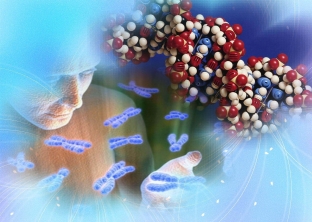Epigenetics – a relatively new branch of genetics that has been called one of the most important biological discoveries since the discovery of DNA. It used to be thought that the set of genes we were born with irreversibly determined our lives. However, it is now known that genes can be "turned on" and “turn off”, as well as achieve their greater or lesser expression under the influence of various lifestyle factors.
Estet-portal.com will tell you what epigenetics is, how it works, and what you can do to improve your chances of winning the health lottery.
Epigenetics: lifestyle changes – key to changing genes
Epigenetics – a science that studies processes that lead to a change in the activity of genes without changing the DNA sequence. Simply put, epigenetics studies the influence of external factors on the activity of genes.
During the Human Genome Project 25,000 genes have been identified in human DNA. DNA can be called the code that an organism uses to build and rebuild itself. However, genes themselves need "instructions" by which they determine the necessary actions and when to perform them.
Epigenetic modifications are the instructions.
There are several types of these modifications, but the two main ones are those affecting methyl groups (carbon and hydrogen) and histones (proteins).
To understand how mods work, imagine that the – it's a light bulb. Methyl groups act as a light switch (i.e. gene), and histones – as a regulator of light intensity (i.e. they regulate the level of gene activity). So, it is believed that a person has four million of these switches, which are activated under the influence of lifestyle and external factors.
The key to understanding the influence of external factors on the activity of genes was the observation of the life of identical twins. Observations have shown how strong the changes in the genes of such twins can be, leading a different lifestyle in different external conditions.

Identical twins are supposed to have "common" diseases, but this is often not the case: alcoholism, Alzheimer's disease, bipolar disorder, schizophrenia, diabetes, cancer, Crohn's disease, and rheumatoid arthritis can only occur in one twin, depending from various factors. The reason for this is epigenetic drift – age-related change in gene expression.
Epigenetic Secrets: How Lifestyle Factors Affect Genes
Studies in epigenetics have shown that only 5% of disease-associated gene mutations are completely deterministic; the remaining 95% can be influenced by diet, behavior and other environmental factors. The healthy lifestyle program allows you to change the activity of 4000 to 5000 different genes.
We are not just the sum of the genes we were born with. It is the person who is the user, it is he who controls his genes. At the same time, it is not so important which "genetic maps" gave you nature – it matters what you do with them.
Epigenetics is still in its infancy, much remains to be learned, but there is evidence of what are the main lifestyle factors that influence gene expression.
- Food, sleep and exercise
It is not surprising that nutrition can affect the state of DNA. A diet rich in processed carbohydrates leads to "attacks" DNA high blood glucose levels. On the other hand, DNA damage can be reversed by:
- sulforaphane (found in broccoli);
- curcumin (as part of turmeric);
- epigallocatechin-3-gallate (found in green tea);
- resveratrol (found in grapes and wine).
In terms of sleep, just a week of lack of sleep negatively affects the activity of more than 700 genes. The expression of genes (117) is positively affected by sports.
- Stress, relationships and even thoughts
Epigeneticists argue that not only such "material" factors like diet, sleep, and exercise affect genes. As it turns out, stress, relationships with people and your thoughts are also significant factors influencing gene expression. So:
- meditation suppresses the expression of pro-inflammatory genes, helping to fight inflammation, ie. protect against Alzheimer's disease, cancer, heart disease and diabetes; at the same time, the effect of such practice is visible after 8 hours of classes;
- 400 scientific studies have shown that gratitude, kindness, optimism, and various techniques that engage the mind and body have a positive effect on gene expression;
- lack of activity, poor nutrition, constant negative emotions, toxins and bad habits, as well as trauma and stress trigger negative epigenetic changes.
Sustainability of results of epigenetic changes and the future of epigenetics
One of the most startling and controversial discoveries is that epigenetic changes are passed on to the next generation without changing the gene sequence. Dr. Mitchell Gaynor, author of The Gene Therapy Plan: Take Control of Your Genetic Fate Through Diet and Lifestyle, believes that gene expression is also inherited.
Epigenetics, says Dr. Randy Jirtle, proves that we are also responsible for the integrity of our genome. We used to think that everything depends on genes. Epigenetics allows us to understand that our behavior and habits can affect the expression of genes in future generations.
Epigenetics – a complex science that has enormous potential. There is still a lot of work to be done to determine exactly which environmental factors influence our genes, how we can (and can) reverse diseases or prevent them in the most effective way.








Add a comment